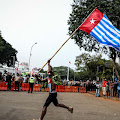masukkan script iklan disini
In 1960, the Dutch colony of West New Guinea (later known as West Papua, West Irian, Irian Jaya, and Papua) embarked on a ten-year plan slated to end in self-determination for its indigenous Papuan population. This plan was presented explicitly within the framework of international decolonization and at the same-time as the United Nations was working out its self-determination law, first enshrined in the UN declaration on the granting of independence to colonial countries and peoples (Dec. 14, 1960). WNG was in many ways the first test case, and the international community failed abysmally. The reason was realpolitik, the strategic cold war imperative of the United States. The US while extolling self-determination as a high and holy principle for West Berlin and elsewhere, abandoned it for WNG. But it should be noted that the principle was also abandoned by the international community and all the players directly involved: Indonesia, Australia, and even the Netherlands. The sole exceptions were a group of African states who saw parallels to their own (then very recent) experience of political decolonization.







